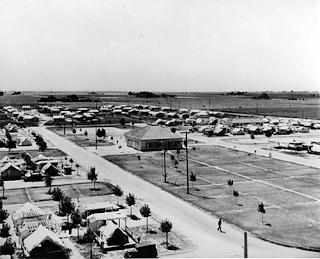Travel Tracer:
Chapters 14-18: The key idea at the beginning of chapters 14 and 15 is that farmers are really not wanted by those in the West since they are viewed as thieves. In Chapter 16 when Rose of Sharon claims that she will go on her own way with her husband, it sparks Ma and she turns all dramatic which is where we can see some action and we can see that the family is scared of Ma when she becomes angry. In Chapter 18. the key event is when the Joads finally reach their final destination- California- and although it should be a great relief to finally be there, only tragedies occur like Grandma's death.
Chapters 19-24: The action begins in Chapter 20 is when the Joad family stays at Hooverville and meet Floyd Knowles which begins a riot against a contractor who does not want to give workers their rights; Tom and Casy join in to try to help Knowles and end up hurting the contractor, so Casy decides to blame the issue on himself so he gets in trouble instead of Tom, who cannot afford to be caught since he is on probation. The major event is Chapter 21 is that landowners form armed forces to try to scare of the "Okies," so they do not come together; farmers continue to die of starvation. In Chapter 22, Tom finds out that the government forces certain corporations to pay the workers much less; he is able to find a job. At the beginning of Chapter 24, the action rises when it is established that the Farmers' Association will start the riot in hopes of shutting down the camp.
Chapters 25-30: The plot becomes tense in Chapter 25 when the landowners take the farmers' crops away leaving them with only a debt. In Chapter 26 it also becomes tense when the Joad family, who have settled in the government camp, are running out of their basic needs and have no job. Then the Joad family is happy to hear that there is employment picking peaches, so they go in hopes of getting a job, but are suddenly punched in the face to hear the wage which will only buy them scarce food even with everyone working. The action rises quickly when Tom finds Casy, after being released from jail, and kills a man that crushes Casy's skull just because he helps starved kids. The Joad family will not leave Tom alone, so they flee in hopes to find another job and sneek food to him. In Chapter 28, Tom's situation becomes tense when one of his little sisters screams out the secret that he had killed two men which could have put him in danger; Ma suggests he runs away, but he claims he is tired of running away. In Chapter 29, the rain comes down hard which halts the cotton work and makes men go crazy and steal to be able to obtain food in order to maintain alive. In Chapter 30, the atrocities continue when the rain continue for days, Rose of Sharon gives birth to a dead baby, and Pa uses up the last bit of money on food. The action begins to fall when the Joad family goes out to seek dry land and comes up to a barn with a boy and a sick man who has not ate in days.










